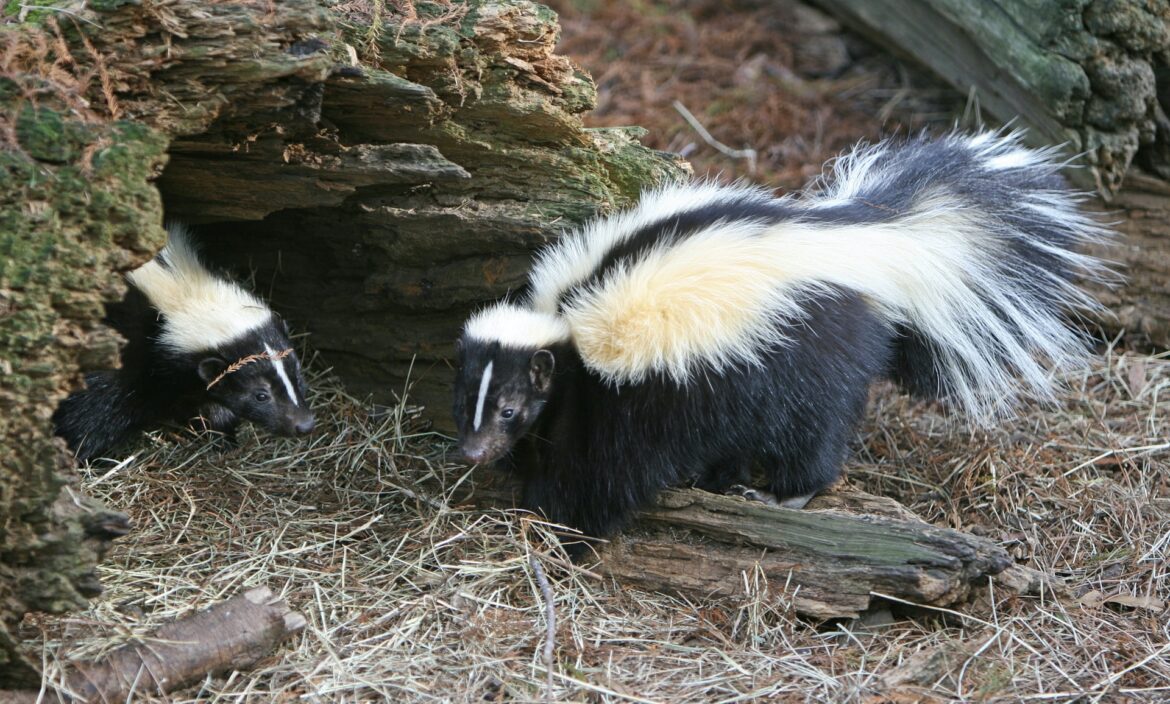
It’s normal to wonder if a skunk smell in house is dangerous, especially at night.The skunk smell can last forever, it is impossible to get rid of. The smell can be strong and pungent, especially if it enters your home. Whether it’s drifting through your windows or seeping through the crevices in the flooring, the skunk smell in your house is unpleasant.
Skunks are famous for secreting musk, a thick and oily substance. This musk contains chemicals that can stick to any surface in your house and linger for days. That’s why the smell of this musk is difficult to get rid of.
An unpleasant smell in your house can be caused by a number of factors, including mold and mildew, rotten food in the refrigerator, or skunk. However, most people believe that the most typical cause of an unpleasant smell in the home is a skunk hiding somewhere within.
But is the skunk still in the house when you smell a pungent odor? Is a skunk smell in the house dangerous? Is the smell caused by something else? Let’s check out the answers below.
Contents
- 1 Is Skunk Smell in House Dangerous?
- 2 Where Is the Skunk Smell in the House Coming From?
- 3 How To Determine Where The Skunk Smell Is Coming From?
- 4 How to Get Rid of a Skunk
- 5 Is Skunk Spray Harmful To Humans? Can Inhaling Skunk Smell Harm You?
- 6 How Long Does Skunk Odor Take To Disappear? How Long Does the Smell of Skunk Last in the House?
- 7 Is It Possible to Smell A Skunk From Inside Your House?
- 8 What Should You Do If Your House Smells Like Skunk? How to Get Rid of Skunk Smell in Home
- 9 Is It Possible For a Gas Leak to Smell Like Skunk?
- 10 Does Skunk Smell Occur In Your House at Night or During the Day?
- 11 How Can You Tell If It’s A Skunk Or A Gas Leak?
- 12 House Smells Like Skunks But There Are No Skunks In The House
Is Skunk Smell in House Dangerous?
Skunk smell is so strong that it can cause disease in both humans and animals. So yes, the skunk smell in the house is dangerous. Skunk spray contains chemicals that can irritate the mucous membranes, causing vomiting and diarrhea, headache, dizziness, and difficulty breathing.
Skunk spray is an effective defense mechanism. Although many people are familiar with the pungent odor of skunk spray, only a few are aware that this odor can be dangerous.
If you spot a skunk, keep your distance and avoid bothering it. Skunk spray contains chemicals that can lead to eye and nose irritation. It can cause difficulties in breathing when inhaled. In severe cases, skunk spray can cause vomiting and temporary blindness.
However, the pungent smells in your house can also come from other sources, some of which are not as harmful as skunk spray.
Where Is the Skunk Smell in the House Coming From?
The skunk smell in the house can be a real pain, especially when you don’t know where it comes from. Besides the skunk spray, a skunk-like smell in the house can also be caused by dead animals, rotten foods, sewer gas lines, or animal excrements in your attic.
How To Determine Where The Skunk Smell Is Coming From?
When you smell a skunk odor in your house, the first thing to do is to figure out the smell’s source. It could be anything from animal corpses to decaying waste, so it’s critical to determine the cause of the problem and remove it appropriately. Follow the steps below to determine where the skunk smell is coming from.
Identify the smell
First, you need to identify the pungent smell. Is the smell strong or faint? If it’s strong, the skunk is probably nearby. Try to identify where the strongest smell is to find the smell source. If the smell is weak, the skunk has most likely sprayed somewhere nearby your house, and the smell may have been scattered by the wind.
Find the strongest skunk smell
If you find the skunk smell stronger near your foundation or basement, the skunk is most likely dwelling under your porch or deck. Skunks prefer to live on a porch or deck rather than an attic or roof because they’re not good climbers.
How to Get Rid of a Skunk
After you figure out where the pungent smell comes from, now it’s time to remove the source. If you see a skunk nearby, close all the windows and doors and scare it away by making loud noises or shining a bright light at it. But if it doesn’t work, you may have to wait until nightfall to catch the skunk in a live trap. After capturing the skunk, you can release it away from your home to more suitable habitat for the animal.
Is Skunk Spray Harmful To Humans? Can Inhaling Skunk Smell Harm You?
Skunk spray is not only extremely unpleasant to smell, but it is also quite dangerous. The fumes emitted by skunks are not only unpleasant, but they can also be hazardous to humans. The skunk smell can irritate the eyes, nose, and throat. They can even cause breathing difficulties in severe cases.
In persons who are prone to asthma, inhaling skunk spray can potentially trigger an attack. Therefore, you should always avoid inhaling the skunk smell. If you come into contact with skunk spray, wash the afflicted area as soon as possible with soap and water.
How Long Does Skunk Odor Take To Disappear? How Long Does the Smell of Skunk Last in the House?
The amount of time it takes for the skunk smell to disappear is determined by the strength of the spray and the amount of air movement. Typically it takes two to three weeks for the odor to disappear completely. The skunk smell might be difficult to get rid of, but with time and patience, it will disappear. The easiest technique to get rid of the skunk smell is to ventilate the area as much as possible and to wash all surfaces with dish soap and baking soda mixture. Clothing should be soaked in a vinegar-water solution before being washed in hot water with laundry detergent.
Is It Possible to Smell A Skunk From Inside Your House?
Yes, you can smell a skunk from inside your house. Skunks have a strong, pungent odor that may travel considerable distances. If a skunk sprays near your house, the odor can easily travel inside through open doors and windows. Once inside, the odor can be difficult to remove.
To avoid skunk odor in your home, it is best to keep skunks away in the first place. Tightly cover trash cans and remove any potential food sources that may attract them. If you see a skunk on your property, keep your distance because they are known to spray when threatened.
What Should You Do If Your House Smells Like Skunk? How to Get Rid of Skunk Smell in Home
It is important to clear the house from the skunk smell after you have removed the smell source.
First, let the air out of the house by opening all of the windows and doors. Then, simply combine white vinegar and water in a basin and leave it for 24 to 48 hours to scent in the part of your house that smells.
Also, clean the surfaces that have traces of the skunk smell. Spray and wipe out the surfaces in your house with vinegar. Don’t forget to wear gloves and protective goggles while cleaning. Vinegar is acidic and corrosive, and it can also cause irritation or burning if splashed onto the skin.
And finally, you should wash any clothing or bedding that has come into contact with the skunk spray. The skunk smell in the house is harmful. Make sure you follow the steps to get rid of skunk odor in the house.
Is It Possible For a Gas Leak to Smell Like Skunk?
A gas leak usually smells like rotten eggs. But it can also smell like a skunk. Gas leaks can cause major health problems and even explosions if not managed properly. It is important to stay alert and notify your local utility provider if you feel something is wrong with your gas line.
Thankfully, there are actually warning signs of gas leaks so you can fix the leaks even before causing problems. So, if you smell something pungent from walls and you believe it is a gas leak, trust your instinct and solve the problem immediately.
Does Skunk Smell Occur In Your House at Night or During the Day?
Skunks are nocturnal and active at night, and they usually spray at night. So if the skunk smell in house at night is strongest, it is most likely caused by a skunk.
But if the smell is present during the day, it is most likely due to something else, such as a gas leak.
How Can You Tell If It’s A Skunk Or A Gas Leak?
There are a few things to consider when you try to determine whether the source of unpleasant odor in your house is a skunk or a gas leak. Here are the steps to sort it out.
First, use your nose to try to find the source of the smell. If the smell is more like rotten eggs, maybe it’s the smell of natural gas. It’s more likely to be a gas leak if it appears to be coming from a specific part of the house.
But if the smell is strong and it is present throughout the house, it is more likely to be a skunk.
Also, you can check the level of airflow in your home to identify the smell. Gas can build up inside your home if there is no sufficient ventilation. On the other hand, skunk sprays are more likely to be found outside so the smell can be stronger in well-ventilated areas.
House Smells Like Skunks But There Are No Skunks In The House
We often assume there is a skunk hiding somewhere inside the house when we smell an unpleasant smell. However, that is not the case.
Sewer gas that has become trapped can cause an unpleasant odor in the house. Sewer gas can sometimes seep out via drains or minor gaps between pipes due to its chemical composition and inherent buoyancy. This smelly gas is typically produced by the degradation of organic components in your sewage system, giving it a strong and lasting odor that smells like rotten foods or animal waste.
To eliminate this odor and prevent further exposure, you should identify and seal any sewer gas sources in your home.



